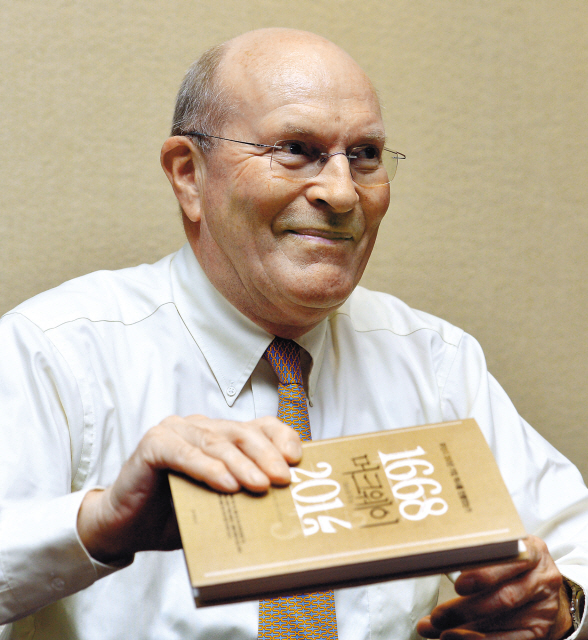‘Choose management wisely,’ advises senior exec of world’s oldest pharmaceutical and chemical company
For the German Merck Group, South Korea remains a worthwhile investment.
“We have invested a lot of money in Korea … (and it’s) an important market and always has been,” said Frank Stangenberg-Haverkamp in an interview with The Korea Herald in Seoul on Monday.
Stangenberg-Haverkamp serves as chairman of the Board of Partners as well as vice chairman of the Executive Board and Family Board for E. Merck KG, the parent company of Merck KGaA. The latter is also referred to as the “German Merck,” to distinguish it from its North American division that separated from the original during World War I.
The German pharmaceutical and chemical giant boasts a history that dates back almost 350 years, and first established operations in Korea in 1989.
According to the senior-level executive, in terms of subsidiaries’ scale for German Merck, Merck Korea comes in second or third place, thanks to its strong liquid crystals and chemicals business sectors.
“We’ve got a very important operation here … we are one of the market leaders in liquid crystals and (Merck Korea) operates very closely with Samsung and LG (in these areas),” Stangenberg-Haverkamp said.
 |
Stangenberg-Haverkamp (Park Hyun-koo/The Korea Herald) |
In cooperation with The Dong-A Ilbo, Merck recently released a book in Korean, titled “The Merck Way,” that details its history and business strategy of the company.
The senior board member said that he hopes the book will offer sound advice for Korean conglomerates and businesses.
“It should help Korean businesses (learn) how to structure business, and how to deal with compliance issues and cooperate governance issues,” he said.
Similar books have been released in German, but this is the first time that such a book has been released in Korean, according to Stangenberg-Haverkamp.
The family-owned company is well-positioned to offer such advice, thanks to its long and successful company legacy, he said. It currently has operations in over 60 countries, according to company data.
“It’s quite unique for a company (to be) 344 years old…and we are definitely the oldest pharmaceutical and chemical company in the world,” he said.
German Merck was able to stay at the forefront of its industries in part due to its focus on finding people with the right credentials, Stangenberg-Haverkamp said.
While about 70 percent of the German Merck Group’s ownership lies in the hands of family members, the company also makes a concerted effort to recruit qualified workers that don’t share the family bloodlines.
Family matters should never take precedence over business matters, and management, especially at the senior levels, should be chosen with the utmost care, he said.
“If you do not have enough (qualified) in the family, which you normally never have, certainly not in the second or third generation, then take (on) outside managers, and involve them, give them the same rights, give them the same importance as family members and let them help you run the business,” Stangenberg-Haverkamp said.
Stangenberg-Haverkamp, who is an 11th-generation member of the Merck family, also said that companies with heavy private ownership should not imbue succeeding generations with a false sense of entitlement.
So while he hopes the family’s younger members will continue on in the company’s tradition of playing a large role for Merck, he said they should probably try to attain the right experience first.
This includes an understanding of how the company’s divisions are run, he said.
“Merck is a very complex animal, because of the variety of things we do: pharmaceuticals, biotech, generics, chemicals, top market positions like in the LCD market, pigments; then (at) Merck Millipore we do laboratory supply of all kinds,” he said.
Senior-level managerial experience is also important before joining the company in an executive position for E. Merck KG and or Merck KGaA, the German businessman said.
“You need experience of having worked in the industry in a senior position that (shows) you can relate to other people,” he said.
Stangenberg-Haverkamp also referred to this skill as social competence, and said that this quality helps people navigate the boardroom and other important business circles.
For the future, the Merck Group will try to help its Korean division expand in other areas.
One particular sector of future growth and expansion for Merck Korea includes pharmaceuticals and medicines in fields of oncology, cardiovascular systems and growth hormones, according to Stangenberg-Haverkamp.
He takes a personal interest in this sector, the former investment banker said. Pharmaceuticals occupy about 60 percent of Merck’s turnover currently, he said.
“The pharmaceutical side is of more interest because it helps other people. So if you can help people get healthy again…or (forget) their pain (due to) our medicine, that’s of course always more fulfilling (personally),” he said.
By Renee Park (
renee@heraldcorp.com)




![[Herald Interview] 'Trump will use tariffs as first line of defense for American manufacturing'](http://res.heraldm.com/phpwas/restmb_idxmake.php?idx=644&simg=/content/image/2024/11/26/20241126050017_0.jpg)

![[Health and care] Getting cancer young: Why cancer isn’t just an older person’s battle](http://res.heraldm.com/phpwas/restmb_idxmake.php?idx=644&simg=/content/image/2024/11/26/20241126050043_0.jpg)

